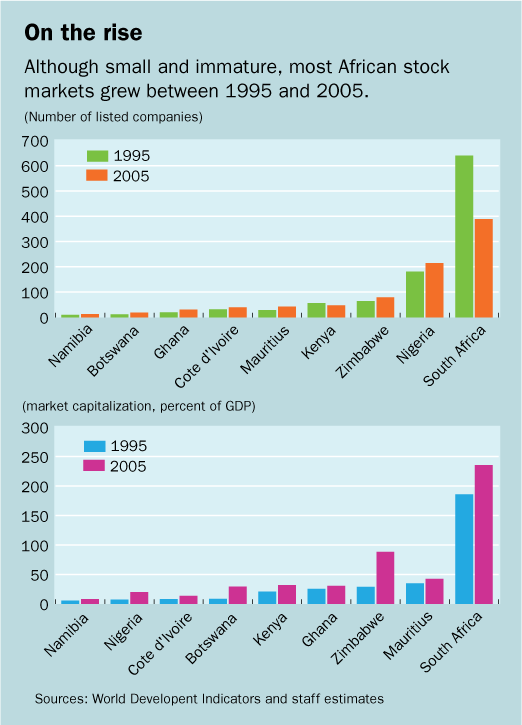
Typical street scene in Santa Ana, El Salvador. (Photo: iStock)
IMF Survey: African Stock Markets Join Global Boom
October 12, 2007
- Although immature, Africa's stock markets continue to perform well
- Stock markets have helped finance African companies' growth
- Regional integration, other steps required to develop African stock markets
African stock markets, following in the wake of the surge in world stock markets over the past few decades, are starting to take off.

Trading floor of Swaziland's stock exchange: with eight quoted prices, it is Africa's smallest (photo: Muajhid Safodien/AFP)
FINANCE FOR AFRICAN COMPANIES
Although starting from a low base, a recent IMF study shows that the region's stock markets have begun to help finance the growth of African companies but must develop further to offer broader economic benefits.
In 1989, only five sub-Saharan African countries had stock markets; today, 16 countries, including Ghana, Malawi, Swaziland, Uganda, and Zambia, have them. Between 1992 and 2002, the capitalization of African stock markets more than doubled from $113 billion to $245 billion.
Low market liquidity
Despite this increase, their average capitalization (excluding the markets of South Africa and Zimbabwe) of about 27 percent of GDP is lower than in most emerging markets (see chart). Malaysia, for example, has a capitalization ratio (market capitalization relative to GDP) of about 160 percent.
Moreover, the region's markets are immature: indicators of stock market development show that they are small and have few listed companies. Market liquidity is also low, with turnover ratio of less than 1 percent in Swaziland compared with about 29 percent in Mexico. Low liquidity implies low business volume and greater difficulty in supporting a local market with its own trading system, market analysis, and brokers.

Supervision by regulatory authorities is often far from adequate. In terms of investment return, however, sub-Saharan Africa's markets continue to perform well. The annual return on the Ghana Stock Exchange, for example, was 144 percent in U.S. dollar terms in 2004 compared with a 30 percent return by MSCI Global Equity Index.
What stock markets can offer
The development of stock markets in Africa is expected to boost domestic savings and increase the quantity and quality of investment. Stock markets are seen as enhancing the operations of domestic financial systems in general and capital markets in particular. Critics, however, argue that a stock market might not perform efficiently in developing countries and that it may not be feasible for all African countries to promote stock markets, given the huge costs and the poor financial structures.
So far, corporate financing patterns in some African countries suggest that stock markets are an important source of finance. The stock market in Ghana financed about 12 percent of total asset growth of listed companies between 1995 and 2002, 16 percent in South Africa between 1996 and 2000, and 8 percent in Zimbabwe between 1994 and 1999. In all these countries, the stock markets were the single most important source of long-term external finance.
At the macroeconomic level, however, the study finds inconclusive evidence that Africa's stock markets have had much effect on growth. Using data from 14 countries, it looks at three stock market indicators—market capitalization relative to GDP, value traded relative to GDP, and turnover ratio—while taking into account countries' initial GDP, domestic investment, and trade openness.
According to the results, the value of shares traded relative to GDP has a positive and significant influence on economic growth, but the capitalization and turnover ratios are too low to influence growth.
Preconditions are lacking
For the region to garner broader economic benefits from its stock markets, the conditions necessary for the markets to function efficiently must be in place:
• Sound macroeconomic environments and sufficiently high income levels:
Income levels, domestic savings, and investment are important determinants of stock
market development in emerging markets.
• Transparent and accountable institutions. Law and order, democratic accountability, and limited corruption reduce political risk and enhance the viability of external finance. They are thus important determinants of stock market development.
• Adequate shareholder protection. Stock market development is more likely in countries with strong shareholder protection because investors do not fear expropriation as much. In addition, ownership in such markets can be more dispersed, which provides liquidity to the market.
• A well-developed banking system. Stock markets should follow after financial sectors have reached a certain depth. For example, a 1 percentage point increase in banking sector development increases stock market development in sub-Saharan Africa by 0.6 percentage points.
Once in place, these conditions will encourage private capital flows, which are also important for stock market development.
New agenda
The policy question is how to promote the development of African stock markets. Promoting stock market development in Africa would require policies to address institutional and infrastructural bottlenecks and to improve liquidity. The main infrastructural bottleneck is the use of slow manual systems.
Even though markets are gradually adopting electronic systems, there are still substantial African stock markets that trade manually and use manual clearing and settlement. Similarly, most markets do not have central depository systems, while some markets still have restricted foreign participation. Such bottlenecks slow trading and induce inactivity.
A number of proposals for an agenda that will promote the development of stock markets in Africa have been advanced. They include the following measures:
Regional integration. Integration would increase the market size of African stock exchanges because the number of national exchanges would decline. This promotes cost efficiency and improves liquidity and price discovery. To succeed, regional approaches require harmonized trading laws and accounting standards, automation, currency convertibility, and a liberalized trade regime.
Automation of trading systems is expected to help reduce costs and inefficiencies and increase trading activity and liquidity by speeding up operations. Automation is an expensive venture, but the cost is coming down as electronic communication networks and alternative trading systems proliferate.
Demutualization is expected to reduce governance problems in mutualized exchanges by opening up trading rights, admitting new trading partners, and broadening ownership to allow the public to invest in exchanges. The absence of these in mutualized exchanges tends to breed poor governance structures. Because traders and brokers in mutualized exchanges enjoy monopoly power through exclusive rights and access to trading systems, their vested interests are protected. Demutualization induces better corporate governance systems because decision making is based on ownership structure and not on trades intermediation. Demutualization would be more useful after African stock markets have improved liquidity and infrastructure and strengthened cooperation.
Involvement of institutional investors. Institutional investors often are at the forefront in promoting efficient market practices and financial innovation. They typically favor greater transparency and market integrity and encourage efficient trading and settlement facilities. Thus, their involvement can help force commercial and investment bank, as well as other market intermediaries, to be more competitive and efficient.
Regular disclosure, transparency, and enforcement are important for stock market development. Important disclosure requirements must be simple and supportive of the legal and accounting framework. Similarly, enforcement procedures need not be long, cumbersome, and expensive. The presence of a securities regulator and a strong legal system in Africa is important to ensure compliance and an ability to prosecute. Strong corporate governance mechanisms in Africa will also help boost investor confidence in regulatory issues.


